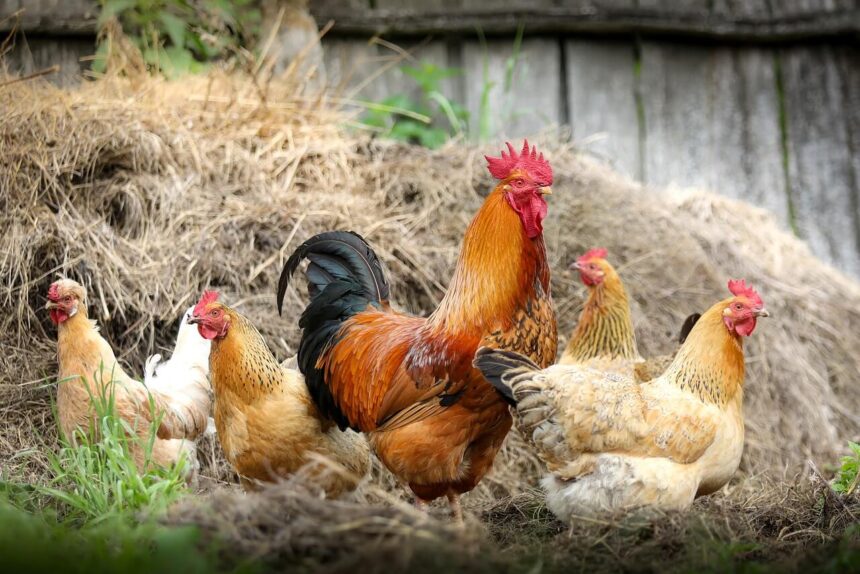Identifying and knowing Infectious Poultry Diseases from an early stage may save you a ton of money from time to time.
How to Spot Infectious Poultry Diseases Chicken Droppings
You can quickly identify these most common diseases in your poultry dropping.
1. Pullorum Disease:
The Salmonella Pullorum bacteria cause this disease, one of the most common contagious poultry diseases.
It usually affects young chicks under four to six weeks old and causes diarrhea, dehydration, and death.
You can tell that the chicks are infected by their whitish diarrhea droppings.
Treatment of Pullorum Disease.
There is no specific treatment for this disease. However, you can try home remedies, such as adding garlic or ginger to the water.
Also, ensure an increase in the coop’s ventilation by always keeping it clean and disinfected.
2. Coccidiosis:
This disease is caused by a protozoan known as Eimeria tenella, one of the most widespread diseases in poultry. It affects all kinds of birds but is most common in chickens. The disease causes severe diarrhea, dehydration, anorexia, and death.
The first sign that your chicken has coccidiosis is when you see blood in its diarrhea droppings.
Treatment of Coccidiosis:
There are many commercial treatments available for this disease. However, you can also try some home remedies.
Adding garlic or ginger to the water can help prevent the disease. You can also try adding apple cider vinegar to the water, as it will create an acidic environment in which the protozoa cannot survive.
3. Fowl Typhoid.
This is one of the most common poultry diseases caused by Salmonella Typhi.
The symptoms include greenish-yellow diarrhea, ruffled feathers, loss of appetite, and lethargy. The droppings of infected birds will have a strong odor and be watery.
Treatment
- Vaccinate all your birds at seven weeks of age.
- Control entry of visitors into the chicken coop
- Use Fowlvax TM
Also, read; How to Raise Pigs for Profit on a Small Farm.
4. Fowl Cholera
Cholera is an infectious disease that affects the gastrointestinal system of birds. It is caused by the bacterium Pasteurella multocida and can affect many bird species, but it is most commonly seen in chickens.
Chickens contract cholera through contact with contaminated water or food or exposure to infected wild birds.
The disease can also spread through contact with contaminated equipment, clothing, or shoes.
How to spot it:
- Diarrhea.
- Vomiting.
- Depression
- Loss of appetite.
- Listlessness.
- Increased thirst.
- Dehydration
- It increased respiratory rate.
- Death (in severe cases)
Treatment
- Positively affected burn birds
- Clean and disinfect the chicken coop.
- Use recommended sulfur drugs for the treatment.
5. Newcastle Disease:
Newcastle disease is a highly contagious and virulent viral disease affecting all bird species. The disease is caused by a Newcastle disease virus (NDV), which belongs to the paramyxovirus family.
The virus can cause various clinical signs, from mild respiratory illness to severe neurological disease.
How to spot it:
- Sneezing.
- Discharge from the eyes and nose.
- Gaping beak.
- Coughing.
- Wheezing.
- Lethargy.
- Decreased appetite.
- Ruffled feathers.
- Depression.
- Diarrhea.
- Neurological signs (in severe cases)
Treatment.
There is no specific treatment for Newcastle disease, and infected birds must be culled to prevent the spread of the virus.
Newcastle disease is only controlled through vaccines. Chicks are vaccinated at the ages of 3-4 weeks. The vaccine is then repeated after 16 weeks and lasts 24 weeks. You can also vaccinate your flock when there is an outbreak.
Conclusion.
Poultry diseases can be hard to spot, but knowing the signs and symptoms of each condition is critical in preventing them from spreading.
Treatment for most poultry diseases is usually through antibiotics or home remedies. However, some conditions, such as Newcastle Disease, require culling infected birds.
Vaccines and good hygiene practices are the best way to prevent your flock from getting sick.
When in doubt, always consult a veterinarian to get a proper diagnosis.





